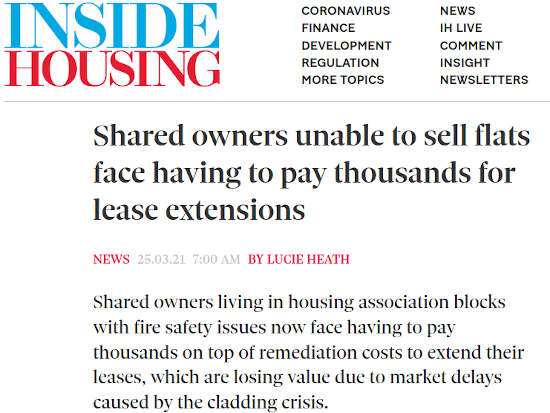
The scandal of housing associations selling 99 year leases is revealed in Inside Housing today as buyers are hit with lease extension costs on top of huge fire safety bills and waking watch costs.
LKP has urged housing associations to sell all shared ownership leases at 999 years, or the legnth of their headlease where they might not own the freeholds.
Thousands of buyers are signed up to 99 year leases, however. Shared ownership is a questionable purchase at the best of times, with considerable complexity involved: you are both a short-term and long-term tenant (iw leaseholder), and disavantaged by both tenures.
The trade magazine for the social housing sector gives the examples of Times Szabo, a shared owner at Royal Artillery Quays in Woolwich, south-east London, with 83 years on her lease from Optivo housing association.
It would cost £10-12,000 to extend, but service charges have risen from £270 a month to £450 a month to pay for waking watch, new fire doors, fire alarm system and higher insurance costs.
Ms Tzabo said: “My view of these really short leases they give is housing associations use shared owners as cash cows… they use us as a means of raising money presumably to turn back into the business to then build social housing. Building social housing is excellent… but how about people like me? Why are you not supporting shared owners? I am very financially vulnerable.”
Optivo said it “grants leases and operates lease extensions in line with the law”.
Tony James, chair of the residents’ association at High Point Village in Hayes, west London, owned by Metropolitan Thames Valley Housing suggests the housing association give the shared owners leases of the same length as its 125-year head lease (which will also have run down).
The shared ownership leases at High Point Village are 99 years.
Metropolitan Thames Valley Housing said its “industry-standard lease lengths” are made clear throughout the sales process and that it is “continuing to investigate how we can further improve our leasehold offer for customers”.
However, shared ownership leaseholders will still be made to pay for lease extensions.
L&Q was also repeating the line that it “aims to be fully transparent about leases at the point of sale”.
Stratford Eye development in east London is awaiting the results of a survey by L&Q to determine the scale of the fire safety issues.
Fabienne Jacquet’s flat was originally sold with a 99-year lease and she currently has 86 years left. Market sale buyers on the same scheme were granted 999-year leases by L&Q.





 Bottomley leads Tory rebellion of 32 MPs, but government defeats amendment to Fire Safety Bill
Bottomley leads Tory rebellion of 32 MPs, but government defeats amendment to Fire Safety Bill






















Buying a 99-year lease is somewhat like buying a house with a flat roof – within 20 years, some capital expenditure will be required. It is hardly a scandal. – The term of the lease is there set out in the lease agreement, and the purchaser, their valuer and their solicitor need to reflect upon this in the two-three months the transaction takes. It is neither morally nor legally wrong from the housing association standpoint. It would also not be legally or morally wrong if it was found that it was deliberately set up to ensure a further wave of capital receipts in 15 – 25 years time. In our free-market economy the vendor is expected to get the best possible price for their asset, and so long as the documents offering the deal clearly set out the terms, I fail to see why the word scandal has to be used. It would be wrong if the wording was written to deceive or undue influence from a developer acting through a solicitor who is not acting in the client’s best interest – that would, of course be morally and legally wrong.
The near hysteria over ground rents due to campaigning has landed lessees with ground rents of just over 0.1% of the value of the property or those with ground rents linked to the RPI having to renegotiate their lease terms, causing a great deal of stress and unnecessary expense. Four years ago, a ground rent of £350 on a flat worth £250k would not have been an issue – but it is now. A ground rent of £150 per annum linked to the RPI every five years on a flat worth £300,000 was of again of no concern. Yet, in a case, I know of, it has caused such an issue that the lessee was signed off from work because of stress. The flat sale fell through twice because of the review period being every five years. Yet if the Government sought to review the state pension every five years there would be near riots on the street. The lessee, in that case, attributes this all to the campaigning, which is binary and myopic in its approach, which fails to adopt a more measured approach to the discussion on ground rent terms.
A ground rent of say £350 on a flat worth £250k is on the highish side but a measured approach would be to see that rent as around £100 per annum more than ideal. Therefore it should be viewed as lowering the value of a flat by possibly as much as £2,000 ( i.e. around 20 times that excessive rent), most certainly not making it unmortgageable and, therefore, in some campaigners eyes – valueless.
As to the capping of ground rents, the Government appears to braced to put on a suit of armour, charge over to Strasburg and fight the good fight to have lessees ground rent lowered from saying £350 to £250 a year. Believing what the campaigners argue that lessees had no idea what they signed up for as it was all written in legalese and were all badly let down by the legal profession. The alternative argument being that they were so desperate to get on to the housing market they had no choice but to sign up. There are many other contracts where similar arguments could be raised – For example, assured shorthold tenancies where tenants are not legally represented prior to signing a contract which may well take in rent 50% or more of their income each month.
To solve the issues over ground rent and lease terms is to ensure that the information about the rent and term is clearly explained PRIOR to entering into the contract. In Leasehold contracts buyers are legally represented and have the additional pair of eyes of a surveyor so the amount of adjustment needed to address these problems is really quite small and modest. Clearly showing the burden the ground rent places on the property and its review pattern and the second being a reminder of the term remaining and the estimated cost of extending in say 5, 10 and 15 years time would give lessees the information they need prior to signing up. Just as we have with credit agreements.